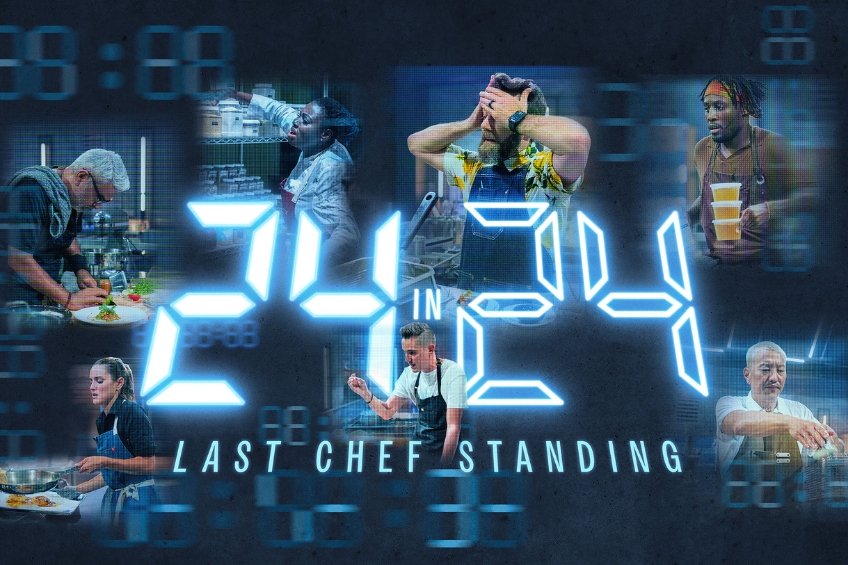
What would happen if you took a full season of a cooking competition show and filmed it in 24 hours straight? That’s exactly what 24 in 24: Last Chef Standing is looking to find out. With 24 chefs competing for $50,000 in 8 different rounds throughout a straight 24 hours of filming, this is not your average cooking competition. From how the chefs are preparing for the marathon of cooking to a BTS glimpse at how a cooking competition show really works, read on for everything to know about this game-changing new series.
Related: Binge-Worthy Shows to Watch in April
Watch 24 in 24: Last Chef Standing on Food Network Canada. Stream Food Network Canada with a STACKTV subscription. Try it free today.
How chefs are preparing for 24 in 24
While some of the chefs in the 24 in 24 kitchen see their entire life as “preparation” for this intense competition, others are taking a more strategic approach: Matt Jordan stayed up for 24 hours two weekends in a row to better understand the effects of sleep deprivation, Martel Stone studied up on his tried and true recipes, and both Chris Oh and Marc Quinones cited their experience running marathons as the ideal training for this experience.
Many of the chefs recognize that staying hydrated and getting nutrition along the way will be the key to their success — as Aarthi Sampath explains: “When I’m making chicken, I’m going to sneak in and eat a piece. That’s how I’m going to stay hydrated, keep my belly full and keep competing.” Similarly, Elizabeth Falkner packed a bag of dates, nuts and chocolate-covered coffee beans to bring into the kitchen with her for when hunger strikes “I figured I probably won’t have time to make espresso and cappuccino like I really like, so I’ll just down those here and there,” she says with a laugh.
A behind-the-scenes-look at the 24 in 24 set
As co-hosts Esther Choi and Michael Symon explain, they arrived to set 12 hours in advance of filming to rehearse and familiarize themselves with the kitchen so that the show runs as smoothly as possible once filming starts.
Unlike other cooking competition shows where the sets typically get cleaned up and reset between segments, you’ll see it all on 24 in 24: from the crew cleaning up to the camera people behind the scenes, this is as raw and real as it gets. “I like that this is a show that’s never been done and seems virtually impossible to pull off,” says Michael. “It’s like four times the size of any crew I’ve ever seen on all the shows I’ve been doing since… I won’t even say when I started, Esther wasn’t even born.”
Related: This is How Chef Michael Symon Flavours Salt
Advice from 24 in 24 chefs on how home cooks can improve their skills
One resounding piece of advice from the cast of 24 in 24 on how to be a better home cook? Practice, practice, practice! Gaining as much experience in the kitchen as possible is a direct path to becoming a better home cook, whether it’s working on your knife skills, trying out new ingredients, or perfecting the recipes you already love.
Beyond that, many chefs see organization as key to success in the kitchen, and recommend laying everything out before you start cooking (AKA mise en place), so that you can execute any recipe with ease.
As for our favourite piece of advice from the 24 in 24 cast? “Recipes are like lines in the road,” says Gabriella Baldwin. “Your best in the kitchen is when you’re in creative mode. Cooking is a creative art.” A close second was Airis Johnson’s wise recommendation: “Watch 24 in 24. I’m sure you’ll learn something.”
Related: 4 Mistakes That Home Cooks Always Make
What to expect from 24 in 24
Competing against 23 other chefs would be a challenge on any cooking show — but doing it for 24 hours straight with no breaks or sleep? That’s a serious undertaking. Michael and Esther compare it to opening a restaurant: “As Esther will tell you, there’s no sleep involved when that happens,” says Michael.
Both co-hosts think the younger competitors may have a slight advantage in the kitchen, since they’re likely still at the point in their careers where they’re doing long hours of working the line. “It’s also muscle memory. Sometimes it takes a little bit to get back to it,” says Esther. “If you haven’t cooked on the line in a while, you need a little bit of practice to get back on it. The younger guys have been doing that in the thick of it every day.”
Regardless, “this show is going to see who has the best core technique and fundamentals,” says Michael. Because unlike cooking at home, competitors won’t be able to Google how to achieve certain techniques, they’ll just need to rely on their own knowledge and abilities.
“It is going to be the truest inside look of how a cooking competition actually works on television,” says Michael. “You’re going to get to see the true bones and grit, and all the errors and joys and misery, you’re going to see it all in real time, which no show has ever done.”
Read more: How to Host a Chopped Party
